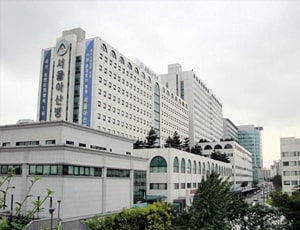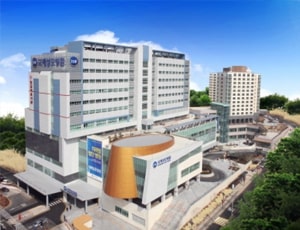The average cost of Stomach Cancer Treatment in Seoul approximately starts from USD 15000
Treatment cost

Asan Medical Centre located in Seoul, South Korea is accredited by ISO. Also listed below are some of the most prominent infrastructural details:


International St. Mary's Hospital located in Seoul, South Korea is accredited by JCI. Also listed below are some of the most prominent infrastructural details:
Stomach cancer, also known as gastric cancer, is the fifth most common cancer worldwide. This disease is a result of the growth of cancerous and malignant cells in the inner lining of the stomach.
Stomach cancer does not grow overnight as this disease usually grows slowly over many years. Some pre-cancerous changes take place before true cancer actually develops. But these early changes rarely result in any symptoms and therefore, often go undetected in the early stage when it is most easy to treat it.
Gastric cancer can grow through the wall of the stomach and invade nearby organs. It can easily spread to the lymph vessels and lymph nodes. In an advanced stage, it can travel through the bloodstream and spread or metastasize to organs such as the liver, lungs, and bones. Usually, people diagnosed with stomach cancer have either experienced metastasis already or eventually develop it.
Stomach cancer should not be confused with other cancers in the abdomen or esophageal cancer. Some other cancers can also occur in the abdomen, including cancer of the large and small intestine, liver or pancreas. These cancers may have different symptoms, outlooks, and options for treatment.
Some other types of stomach cancers include squamous and small cell carcinoma and leiomyosarcoma. These cancers are very rare.
There is no single, definite cause behind stomach cancer. However, several stomach cancer risk factors have been identified that could potentially lead to the formation to a tumor in the stomach. Some of these stomach cancer causes or risk factors include:
There can be several early stomach cancer symptoms. However, the signs of stomach cancer could be present because of some other underlying condition as well. Unfortunately, this is the main reason why it is difficult to make a stomach cancer diagnosis at an early stage.
Some of the early stomach cancer symptoms may include:
But just experiencing indigestion or heartburn after a meal does not mean that you have cancer. Although, if you experience these symptoms a lot, talk to your doctor, who can decide whether to conduct further tests or not.
As advanced gastric cancer grow, you may experience more serious signs of stomach cancer, including the following:
There are many options for stomach cancer treatment. Your specialist will choose the most appropriate treatment plan for you, depending on the stage of your cancer.
Most often, a combination of the following stomach cancer treatment options is used to remove tumor:
Stage 0 stomach cancer treatment: It is mostly treated with the help of an endoscopic surgery.
Stage 1 stomach cancer treatment: It is mostly treated with the help of an endoscopic surgery, followed up with a few session of chemotherapy. Sometimes, the surgeon may advise you to undergo a few session of chemotherapy before the surgery as well.
Stage 2 stomach cancer treatment: Surgery is the main treatment option followed by chemotherapy. If you decide against the surgery, a combination of chemotherapy and radiotherapy may be used.
Stage 3 stomach cancer treatment: A few cycles of chemotherapy are conducted before the surgery, followed up with a surgery. Following the surgery, a few cycles of chemotherapy are repeated, followed by radiation therapy.
Stage 4 stomach cancer treatment: Chemotherapy is the main treatment option for such patients. A surgery can be conducted to control the symptoms. Radiotherapy could be used if needed to relieve symptoms.
Recovery after stomach cancer treatment can take a long time. You may need special palliative care to manage the discomforting symptoms such as extreme pain. With constant support from the doctors, friends, nurses and family members, the health eventually feels better and you are able to experience an improved quality of life.
You may not be able to eat properly or by your own immediately after the surgery. However, you are able to return back to your normal routine in a few days. Planning and managing regular chemotherapy visits after the surgery can be difficult.
Discuss with your doctor about specific side effects that you are likely to face after chemotherapy. The doctor will give you specific medications that will help relieve specific symptoms such as nausea, weakness, vomiting, joint pain, and headache.
Ask your healthcare adviser for the best multiple options and choose the one that meets your expectations
On an average, Stomach Cancer Treatment in Seoul costs about $15000. There many KOIHA certified hospitals in Seoul that offer Stomach Cancer Treatment.
Different hospitals have different pricing policy when it comes to the cost of Stomach Cancer Treatment in Seoul. The Stomach Cancer Treatment package cost usually includes all the expenses related to pre and post surgery expenses of the patient. The treatment cost usually includes the expenses related to hospitalization, surgery, nursing, medicines, and anesthesia. A prolonged hospital stay due to delayed recovery, new diagnosis and complications after surgery may increase the cost of Stomach Cancer Treatment in Seoul.
There are several best hospitals for Stomach Cancer Treatment in Seoul. The following are some of the most renowned hospitals for Stomach Cancer Treatment in Seoul:
While the speed of recovery may vary from patient to patient, they are still required to stay for about 23 days after discharge. This period is important to conduct all the follow-up tests to ensure that the surgery was successful and the patient can go back to the home country.
Apart from the Stomach Cancer Treatment cost, there are a few other daily charges that the patient may have to pay. The per day extra expenses in Seoul per person are about 40 USD.
The patient has to spend about 5 Days in the hospital after Stomach Cancer Treatment for proper recovery and to get clearance for discharge. During the recovery, the patient is carefully monitored and control tests are performed to see that everything is okay. If required, physiotherapy sessions are also planned during recovery in hospital.
There are around 2 Hospitals hospitals in Seoul that offer Stomach Cancer Treatment to international patients. These hospitals have the required expertise as well as infrastructure available to handly patients who need Stomach Cancer Treatment. Apart from good services, the hospitals are known to follow all standard and legal guidelines as dictated by the local medical affairs body or organization.
Some of the most sought after doctors for Stomach Cancer Treatment in Seoul are: